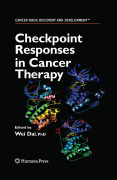
Extensive research has uncovered a set of molecular surveillance mechanisms –commonly called ‘checkpoints’ – which tightly monitor cell-cycle processes. Today’s anticancer drug development has identified many of these cell-cycle checkpoint molecules as effective targets. Research now promises to uncover a newgeneration of anticancer drugs with improved therapeutic indices based on their ability to target emerging checkpoint components. Checkpoint Responses in Cancer Therapy summarizes the advances made over the past 20 years, identifyingcomponents of cell-cycle checkpoints and their molecular regulation during checkpoint activation and validating the use of checkpoint proteins as targets for the development of anticancer drugs. This book’s distinguished panel of authors takes a close look at topics ranging from the major molecular players affecting DNA synthesis and the response to DNA damage to advances made in the identification of chemical compounds capable of inhibiting individual mitotic kinases. First book to summarize recent advances in identifying components of cell-cycle checkpoints and validating the use of checkpoint proteins as targets for the development of anticancer drugs Distinguished authors write on topics that range from the molecular players affecting DNA synthesis and the responseto DNA damage, to advances in the identification of inhibitors for individualmitotic kinases INDICE: Action of the RB pathway in response to therapeutic agents.- Targeting the p53/MDM2 pathway for cancer therapy.- DNA topoisomerases as targets for the chemotherapeutic treatment of cancer.- Targeting the DNA damage checkpoint (ATM/ATR).- Compounds that abrogate the G2 checkpoint.- CDK inhibitors as anti-cancer agents.- CHFR as a potential anti-cancer target.- Antimicrotubule agents.- Kinesin motor inhibitors as effective anti-cancer drugs.- Targeting the spindle checkpoint in cancer chemotherapy.- Anti-proliferation inhibitors targeting aurora kinases.- Plks as novel targets for cancer drug design.- Do histone deacetylase inhibitors target cell cycle checkpoints that monitor heterochromatin structure?
- ISBN: 978-1-58829-930-7
- Editorial: Humana
- Encuadernacion: Cartoné
- Páginas: 300
- Fecha Publicación: 01/06/2008
- Nº Volúmenes: 1
- Idioma: Inglés
